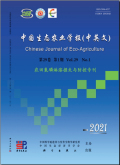中国生态农业学报(中英文)2024,Vol.32Issue(1):53-60,8.DOI:10.12357/cjea.20230429
有机和常规管理对茶园土壤固碳的影响
Effects of organic and conventional management on soil carbon sequestration in tea gardens:comparison with forest land
摘要
Abstract
To explore the effects of organic and conventional management methods on soil organic carbon in tea gardens,we selected three typical land use types in Simao District,Pu'er City,Yunnan Province to carry out the investigation.The three land use types were a conventionally managed tea garden,an organically managed tea garden,and a nearby natural forest land.Based on the land use types,we measured the contents of soil organic carbon(SOC),easily oxidizable organic carbon(EOC),non-liable organic carbon(NLOC),particulate organic carbon(POC),and mineral-associated organic carbon(MOC)in 0-20 cm and 20-40 cm soil layers in three sample plots.We estimated the distribution ratio of the different types of organic carbon in soil and the soil carbon pool manage-ment index(CPMI),and analyzed the changes of the content of SOC component and quality of soil carbon pool from the selected land use types.The results were as follows:1)the content and storage of SOC in the 0-40 cm soil layer of the conventionally managed tea garden were significantly lower than those in the natural forest land by 48.67%-51.94%and 27.25%-35.71%(P<0.05),respectively.The content and storage of SOC in the 0-40 cm soil layer of the organically managed tea garden were respectively 52.09%-62.86%and 15.54%-20.26%higher than those in the conventionally managed tea garden(P<0.05).2)In the 0-20 cm and 20-40 cm soil lay-ers,the contents of EOC,NLOC,POC,and MOC in the soils from the tea garden under conventional management were significantly lower than those from the natural forest land(P<0.05).The contents of EOC,NLOC,POC,and MOC in the soils from the organic-ally managed tea garden were significantly higher than those from the conventionally managed tea garden(P<0.05),which were high-er by 46.39%-57.89%,54.24%-66.15%,80.87%-121.01%,and 40.07%-46.28%,respectively.3)The POC/SOC and NLOC/SOC of the tea garden under conventional management were lower than those of natural forest land,while the POC/SOC and NLOC/SOC of organically managed tea garden were higher than those of conventionally managed tea garden.4)Conventionally managed tea gar-dens had high CP AI and low CPMI.The CPMI of conventionally managed tea garden was 24.53%-46.12%lower than that of the natural forest land(P<0.05),and the CPMI of organically managed tea garden was 67.88%-100.33%higher than that of convention-ally managed tea garden(P<0.05).The aforementioned results showed that when compared with natural forest land,the reclamation of tea plantations with conventional management measures can reduce SOC content and soil carbon pool quality,resulting in a cer-tain degree of land degradation.Given the limitations of conventional management,organic management is an effective measure for improving the quality of the soil carbon pool in tea plantations.关键词
茶园/有机管理/土壤有机碳/土壤碳库管理指数/自然林地Key words
Tea garden/Organic management/Soil organic carbon/Soil carbon pool management index/Natural forest land分类
农业科技引用本文复制引用
郑玉婷,黄鑫慧,李浩,王彪,李攀锋,崔吉晓,隋鹏,高旺盛,陈源泉..有机和常规管理对茶园土壤固碳的影响[J].中国生态农业学报(中英文),2024,32(1):53-60,8.基金项目
云南省重大科技专项(202202AE090029)资助 This study was supported by the Key Science and Technology Project of Yunnan Province(202202AE090029). (202202AE090029)

